Baku To Allow Israel To Use Its Airfields To Attack Iran - Report
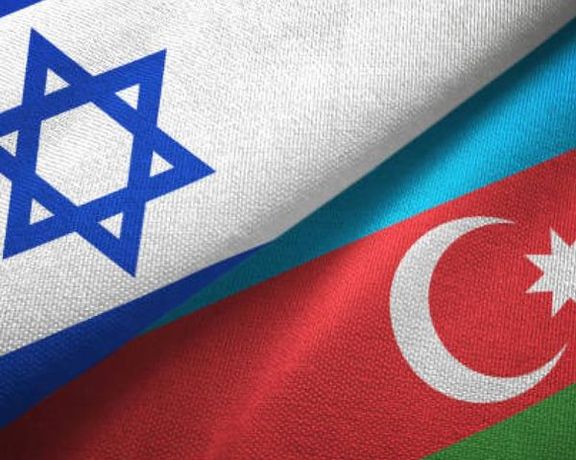
Azerbaijan is to allow Israel to use its airfields in case of a possible attack against Iran's nuclear facilities as part of their military cooperation media say.

Azerbaijan is to allow Israel to use its airfields in case of a possible attack against Iran's nuclear facilities as part of their military cooperation media say.
The revelations were published in the left-wing Israeli daily, Haaretz, which found that over the past seven years, 92 cargo flights flown by Azerbaijani Silk Way Airlines have landed at the Ovda air base, the only airfield in Israel through which explosives may be flown into and out of the country.
According to the report, during times of conflict between the Republic of Azerbaijan and Armenia, the number of flights between Israel and Azerbaijan also increases.
In return for military support, Azerbaijan has allowed Israel's secret service, Mossad, to set up a forward branch to monitor what is happening in Iran," according to Haaretz. Baku has even prepared a dedicated airfield intended to aid Israel in case it decides to attack Iranian nuclear sites, according to the investigation.
Azerbaijan and Israel have been increasingly public in their growing ties. While Israel has had an embassy in Azerbaijan since the 1990s, just in January, Azerbaijan formally appointed its first ambassador to the Jewish state.
Iran continued to dominate headlines in Israel over the weekend in the wake of the visit of the chief of the International Atomic Energy Agency, Rafael Grossi. In Tehran, Grossi claimed that an Israeli attack on the Iranian nuclear facilities is against the law.
It was met with a harsh response from Netanyahu: "Rafael Grossi is a worthy gentleman who said something unworthy. Against which law? Is Iran, which openly calls for our destruction, permitted to defend the destructive weapons that would slaughter us? Are we permitted to defend ourselves? It is clear that we are and it is clear that we will do so."
He added, "Nothing will deter us from defending our country and preventing our enemies from eliminating the state of the Jews."
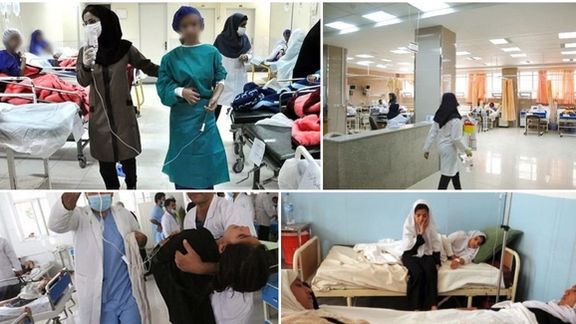
About 80 more schools were targeted by chemical attacks on Sunday with dozens of girls hospitalized, as the international community demands answers to the mysterious poisonings.
The poisonings, targeting girls' schools since November, have been ramped up this week with hundreds more girls falling sick across Iran.
Social media videos surfaced on Sunday show that students were poisoned in many cities, including Fouladshahr and some other cities in Esfahan (Isfahan) province, Karaj and Fardis in Alborz province, Tabriz, Yazd, Hamedan, Shiraz, Ramhormoz and Mahshahr in Khuzestan province, Qazvin, Gonbad-e Kavus in Golestan, and the capital Tehran. Only In the city of Yazd, at least eight schools were attacked on Sunday.
On Saturday alone, schools in 33 cities were targeted by the same gas that has already affected around 1,500 students in recent weeks.
The scale of the intentional poisoning of female students -- which started in the religious city of Qom and spread further throughout the country and reached schools in small towns and villages -- has stepped up in recent weeks, becoming a daily occurrence.
State media is trying to downplay the seriousness of the incidents, with some officials such as former MP Jamileh Kadivar calling the attacks “mass hysteria.”
Many, such as Dr. Mohammadreza Hashemian, a doctor in the special care department of Masih Daneshvari Hospital, fear the poisonings are being led by regime authorities. He said that the gases used to poison the students are a combination of different chemicals, which it is "not possible for ordinary people" to access.
With women and girls having been at the forefront of protests, burning headscarves and cutting their hair in defiance of the regime, it is believed that the attacks are a coordinated effort to deter the young students from supporting ongoing unrest, triggered by the death of the young woman, Mahsa Amini. Her death in morality police custody after being arrested for the inappropriate use of her headscarf, has triggered national protest since September.
The patterns of the school attacks are similar to chemical attacks committed by radical Islamists in Chechnya and the Taliban in Afghanistan.
The regime’s Health Minister Bahram Eynollahi admitted that the girls have suffered "mild poison" attacks, while Interior Minister Abdolreza Rahmani Fazli said on Saturday, "In field studies, suspicious samples have been found, which are being investigated... to identify the causes of the students' illness, and the results will be published as soon as possible."
Outraged by the Islamic Republic’s inaction and reluctance to identify and arrest those behind the attacks, many parents, students and other activists have held demonstrations outside the buildings of the Education Ministry across the country, but security forces attacked the gatherings and arrested some of the parents and students.
In a gathering of parents outside an Education Ministry building in Tehran, people chanted "Basij, Guards, you are our Daesh," likening the Revolutionary Guards and other security forces to the Islamic State group. Comparing the Islamic Republic with the Taliban, protesters also chanted "Death to the Taliban, whether in Iran or Afghanistan".
Also on Sunday, a group of about 420 Iranian political and civil activists issued a statement to media, describing the poisoning of students as a "criminal act" that has caused "national concern".
On Friday, the United Nations human rights office in Geneva called for a transparent investigation into the attacks. Countries including the US and Germany have also voiced concern.
Nobel Peace Prize winner and human rights lawyer Shirin Ebadi says there is no doubt about the role of the regime in the mass poisoning attacks. Iran's exiled queen Farah Pahlavi also condemned the attacks, saying the Islamic Republic is showing parts of "its impure nature to the world."
Exiled prince Reza Pahlavi also tweeted, “Iranian girls are being poisoned at schools across Iran. I urge the international community to bring pressure on the regime and demand access for investigations on-the-ground in Iran. Khamenei and his regime must be stopped.”
Canada-based activist Hamed Esmaeilion, whose daughter and wife were killed by the IRGC, also decried the school attacks, calling on the international community and democratic governments not to remain silent. “Will you finally stand with the people of Iran and expel the Islamic Republic Ambassadors?” he asked.

Israel rebuffed as "unworthy" on Sunday comments by the UN nuclear watchdog chief that any Israeli or US attack on Iran's nuclear facilities would be illegal.
Having visited Tehran in a bid to loosen deadlocked talks on renewing its 2015 nuclear deal with world powers, International Atomic Energy Agency chairman Raphael Grossi on Saturday said "any military attack on nuclear facilities is outlawed".
He was responding to a reporter's question about threats by Israel and the United States to attack Iran's nuclear facilities if they deem diplomacy meant to deny it the bomb to be at a dead end. Tehran says its nuclear program is peaceful.
"Rafael Grossi is a worthy person who made an unworthy remark," Israeli Prime Minister Benjamin Netanyahu told his cabinet in televised remarks on Sunday.
"Outside what law? Is it permissible for Iran, which openly calls for our destruction, to organize the tools of slaughter for our destruction? Are we forbidden from defending ourselves? We are obviously permitted to do this."
The IAEA said on Saturday Grossi had received sweeping assurances from Iran that it will assist a long-stalled investigation into uranium particles found at undeclared sites and re-install removed monitoring equipment.
Israel has long maintained that it will use all means at its disposal to prevent the Islamic Republic from acquiring nuclear weapons. The United States has also said that all options are on the table if Tehran moves toward weaponization.
Reuters report
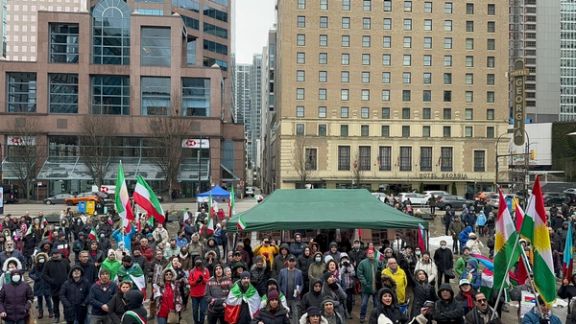
Thousands of Iranians in major cities around the world have staged demonstrations against the Islamic regime and called for global attention to the country's brutal crackdown on protesters, including scores of chemical attacks on girls' schools.
In Vancouver, Canada, hundreds came out to demonstrate and call for global attention to chemical attacks on girls' schools around the country. A group of representatives of conservative parties and the New Democratic Party of Canada were also present at the demonstration.
In Toronto and Montreal similar protests were held seeing hundreds protest on a cold and snowy day in solidarity to condemn the poisoning of schoolgirls which began in the religious city of Qom in November.
In the US, Iranians living in San Diego, California, showed their solidarity with fellow countrymen by holding demonstrations and demanding an end to torture and oppression in Iran. Demonstrators also displayed a photo of Pirouz, the lost Iranian cheetah which died of kidney failure last week, three of the country's last of the endangered species.
Iranians living in Sydney, Munich, Hamburg, and Copenhagen held similar rallies.
Three months into the serial poisoning of students which have affected scores of girls' schools, it is believed over 1,000 students have been targeted with unknown numbers hospitalized around the country. No culprits have yet been found nor any answers as to the chemical agents being used.
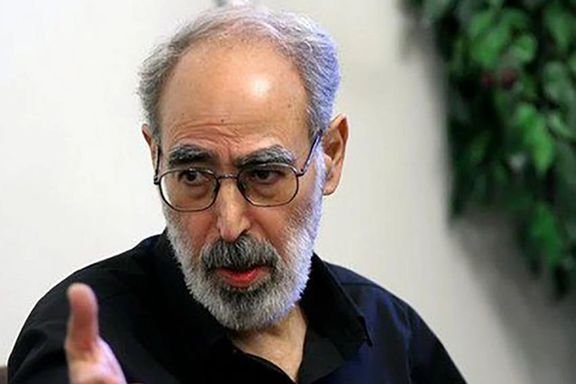
An Islamic revolutionary turned regime critic, has accused Ali Khamenei of the poison attacks on girls' schools which have left hundreds of students sick and numerous hospitalized.
Abolfazl Qadiani (Ghadyani) said the scores of incidents around the country since November, are a "revenge" against the Women, Life, Freedom movement, at the forefront of which have been schoolgirls and students.
In a statement, Qadiani said of Khamenei: "In his false belief, by suppressing the street gatherings, he found an opportunity to take revenge to appease his evil spirit. So, he has targeted the physical and mental health and safety of the brave pioneers of the movement.”
Qadiani belonged to a leftist, revolutionary group that was supporting Khamenei until the disputed presidential election of 2009, when the Supreme Leader backed the questionable reelection of Mahmoud Ahmadinejad. Qadiani, with many others, protested the results, was jailed and became an opposition figure.
“Khamenei is the same criminal who took revenge on the Americans by throwing some firecrackers in Ain al-Asad, but on that ominous day, with two rockets, he deliberately killed the innocent passengers of the Ukrainian plane in order to use their noble lives and bodies as a human shield for himself,” he said this week.
Qadiani was referring to the downing of a Ukrainian International Airlines flight taking off from Tehran in January 2020, hours after Iran had fired missiles at US bases in Iraq. The IRGC brought the passenger plane down by two missiles and all 176 onboard died.
Interior Minister Ahmad Vahidi, an ex IRGC commander wanted by Interpol for his part in the bombing of a Jewish community center in Buenos Aires in 1994, has been assigned to lead the investigation. No arrests have so far been made.
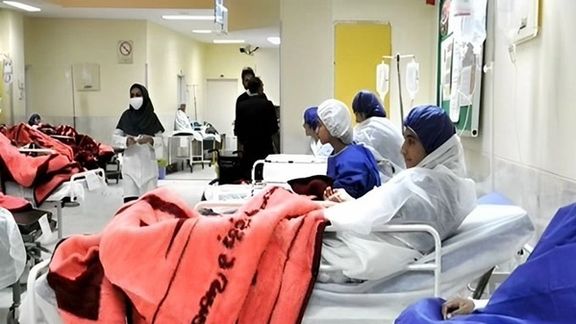
More than three months after gas attacks began on girls' schools in Iran, the Ministry of Education has not shown any serious reaction to the shocking events.
According to Khabar Online news website in Tehran, at least 1,200 girls have been poisoned by the attacks just in Qom and Boroujerd. Other chemical attacks have also occurred in Tehran, Karaj, Kermanshah and Ardabil.
Khabar Online wrote on Saturday that the education ministry's silence is questionable as it has been quick to react to students singing a funny folk song at a school in Ghaem Shahr (Shahi) in February. The reaction in that case started from firing the teacher and forcing her to apologize on Instagram for "failing to take care of pupils."
The report said that explanations offered so far by officials are generally excuses made usually in the form of news fabrication. The only official reaction by Education Minister Yousef Nouri was dismissing the news of the attacks as "rumors".
Most other Iranian politicians either flatly denied the reports or like President Ebrahim Raisi blamed "the enemies" for the attacks. Many others who usually pass off-hand judgement on almost every development blaming intelligence agencies of the United States or Israel have followed Raisi.
Media linked to the government, including the Tehran Municipality's Hamshahri, implicated opposition leaders such as Prince Reza Pahlavi, women's right activist Masih Alinejad and National Council of Resistance leader Maryam Rajavi and published their pictures as "culprits." Obviously, a few hardliner loyalists believe such accusations in Iran.
But blaming “enemies” also begs the question of where more than a dozen intelligence agencies are when foreign agents can roam around throwing chemical gases into schools.
Meanwhile, the minister implicitly asked the media to push the news of the chemical attacks under the carpet so that the ministry could make up for the educational backlog resulting from the pandemic.
Some hardliners such as the Islamic Coalition Party member Ahmad Karimi-Esfahani flately denied the reports and videos about the gas attacks. He said that those reports were fabricated by "the enemies." The politician further claimed that "it has not been proven yet that anyone has been poisoned" and that "the attacks exist only on social media." This comes while the government has been sending tens of ambulance buses to the schools that were attack and videos of students at hospital are going viral on social media and foreign-based Persian media.
Earlier, vigilante leader Hossein Allahkaram told reporters in Tehran that the news of the attacks were "part of a plot to destabilize and disintegrate Iran and keep the Women, Life Freedom movement going."
Karimi-Esfahani also claimed that disseminating the news of the poisonings were part of "a plot hatched by the enemies." He also claimed that a deputy education minister's statement about "the attacks being launched by a group who opposes the idea of girls going to school was later denied."
Some former Iranian officials such as former Culture Minister Ataollah Mohajerani claimed on social media that the advocates of Women, Life Freedom Movement have deliberately poisoned the students. More shameless accusations are levelled by officials who claimed "the students have poisoned themselves!"
Reformist media in Iran, however, characterized the attacks as "organized crime" and urged the officials to offer convincing explanations rather than levelling fictitious accusations.